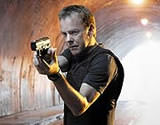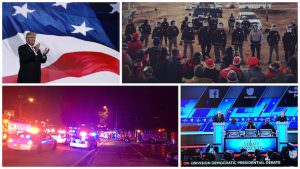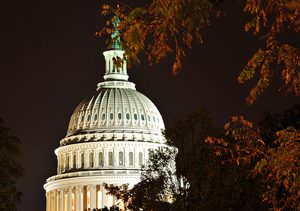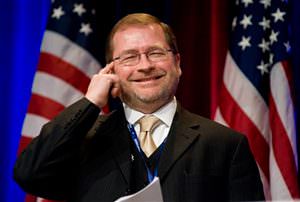What Would Jack Bauer Really Do?
In championing ?24,? Pat Buchanan and Bush administration apologists oversimplify a complex depiction of counter-terrorism and also use an idealized fictional violence to justify real-world abuses of the law and authority.
Adam ElkusIn a Jan. 22, 2006, essay that quickly circulated throughout the Republican blogosphere, Patrick Buchanan asked, ?What would Jack Bauer do?? in response to the ever-escalating war on terror. Buchanan and a number of Republican bloggers claimed an affinity with the fictional counter-terror agent of the hit series ?24,? praising his willingness to ?[put his] love of country and loyalty to friends first and [fight] by his own rules.? By this, Buchanan means he admires Bauer?s determination to protect the United States by any means necessary?whether by disobeying the orders of superiors, torturing, taking hostages or breaking almost every other law in the book. Buchanan castigates Democrats for attacking President George W. Bush?s own Bauer-esque tactics: warrantless NSA wiretaps, secret detention centers in Eastern Europe, the military?s alleged abuse of prisoners in Abu Ghraib, Afghanistan and Guantanamo Bay, and the detention of Jose Padilla in the dirty-bomber case. Buchanan goes on to state that such harsh actions are warranted and supported by popular opinion:
Believing the character of this war where the enemy?s preferred tactic is to slaughter civilians with terror bombings, people seem to agree that we have to follow Jack Bauer?s rules, not ACLU rules. ? We want to think of ourselves as decent people who fight wars honorably. But we believe the enemies of 9-11 are so evil, so depraved, they forfeit the right to be treated honorably.
Yet Buchanan himself concedes that fighting by Jack Bauer?s rules may be ?violating the Geneva Convention ? ignoring constitutional protections ? and violating international agreements prohibiting torture and the ?rendition? of prisoners to countries where torture is practiced.? Nevertheless, Buchanan and many other conservatives argue that such provisions are outdated and cannot protect America from its enemies. But would Jack Bauer really just push the lily-livered liberals out of the way to do what was necessary? Yes and no. In championing ?24,? Buchanan and Bush administration apologists oversimplify a complex depiction of counter-terrorism and also use an idealized fiction to justify real-world abuses of the law and authority.
A superficial viewing of ?24? gives conservative viewers plenty of ammunition. Agent Jack Bauer obeys only his own conscience, breaking regulations and bucking the authority of his superiors in order to get the job done. Bauer has no compunctions about inflicting horrific violence on terrorists or suspected foes, by killing or torturing them; he also has threatened their loved ones to obtain information. Bauer is explicitly opposed by corrupt and inefficient bureaucrats as well as bleeding hearts such Amnesty Global (a thinly drawn caricature of Amnesty International) who intervene in season four to protect the civil rights of a villain. Bauer, as Buchanan correctly points out, is a vigilante-with-a-badge hero in the tradition of ?High Noon? and ?Dirty Harry,? in Buchanan?s words a ?flawed, but good man in a struggle against evil.? This image holds a certain appeal for Bush and conservatives. Thus, the TV show can become a kind of catharsis for Americans frightened of enemies both in Iraq and lurking at home: Through Bauer, the viewer can exorcise the phantom-like presence of Al Qaeda. Certainly, Bauer?s Lone Ranger characteristics are part of the image that Bush has tried to project ever since 9/11.
However, the implications of ?24? are in fact much more complex than Buchanan recognizes. He and other conservatives cherry-pick messages from the show to support their arguments and ignore the disturbing cynicism and alarm at the heart of the show?s complex storyline. For example, Bauer does not live in the black-and-white world of George W. Bush, where there are only evildoers and good men out to thwart them. The greatest threat to Bauer is not foreign terrorists but angry ex-agents, government officials and wealthy CEOs. In season five, a right-wing cabal led by the president?s chief of staff gives nerve gas to anti-Russian terrorists and plans to double-cross the terrorists and use the gas as a pretext for invading the energy-rich Russian province that the terrorists call home; the vice president convinces the president to illegally declare martial law; the Department of Homeland Security deliberately suppresses and fires Bauer?s colleagues who are working overtime to stop the killers. In every season, corrupt officials, moles and traitors all out for their own interests populate every sector of the government. The executive branch, represented by the vacillating and cowardly President Logan, is incompetent and, in a plot twist, in league with the enemy. Far from providing any justification for the actions of the Bush administration, ?24? is a convincing argument against the concentration of power in the hands of those too corrupt or ineffectual to handle the responsibility.
The complex message of the show is that we live in a dangerous world with far too many variables to justify pat formulas and flag-waving sloganeering. For example, Bauer is forced to execute his boss and friend, Ryan Chappelle, to appease a terrorist. The villain would have released a deadly virus that Bauer was not able to stop. Bauer and everyone complicit in this action know that it was the correct thing to do, but it was not morally right. Bauer and his colleagues must make many more decisions that compromise morality?and possibly their own humanity. Bauer is constantly confronted with the problem of having to sacrifice a few innocent lives to save many others who are threatened by terrorists and scheming government officials.
Buchanan and others who ask ?What would Jack Bauer do?? also gloss over the many unrealistic aspects of the series. Bauer and his Counter Terrorism Unit comrades are self-sacrificing and heroic to an absurd extent, going to unrealistic, Hollywood-esque lengths to stop the terrorists. Bauer in particular, like ?Dirty? Harry Callahan, is a quasi-monastic figure whose integrity, power and judgment are almost infallible. To treat Jack Bauer as if he is real is like believing that Superman flies over Metropolis. Real-life examples of vigilantes are likely to be comparable to the Los Angeles Rampart cops. They did whatever they thought was necessary to put the gangbangers away?but they became gangsters themselves, dealing drugs and falsifying evidence. One could also point to Bush?s own use of unreliable intelligence and scare tactics to convince Americans to support a war that is now recognized by a majority of the public as a failure. Nietzsche warned, ?He who fights with monsters might take care lest he thereby become a monster. And if you gaze for long into an abyss, the abyss gazes also into you.? In real life, ?Dirty Harry? tactics are used by dirty cops. People are fallible?they can and will make terrible mistakes.
Ironically, Jack Bauer himself would most likely have been marginalized under Bush?s command. Like former counter-terrorism official Richard Clarke, Bauer tries to speak truth to power, and in the Bush White House such inconveniences are not tolerated. When Gen. Eric Shinseki told the president that the occupation of Iraq would require several hundred thousand troops, he was rebuked in public by his superiors. When several FBI agents tried to warn their superiors about 9/11, they were ignored. The Bush administration?s contempt for those who point out fact instead of toe the line would have made it so that Bauer would not have lasted a day in a real-life Counter Terrorism Unit.
Next Page: “Bush has thrived on projecting himself as a Jack Bauer, a Lone Star individualist going against entrenched Washington politics to do good, when in reality he is as much a product of that same corrupt system as those he rails against.” Perhaps the best example of the right-wing misappropriation of ?24? is the show?s depiction of torture. Torture is shown to be far more complicated than Buchanan suggests: Season five?s main villain, Henderson, toughs out his torturer, and in seasons four and five, Jack Bauer and company repeatedly torture innocent people based on hearsay or faulty evidence. At one point, Bauer?s superiors even torture his love interest, Audrey Raines, based on an accusation from an untrustworthy European intelligence broker. Furthermore, Bauer loses more and more of his soul and sanity with every violent action he undertakes. Over the course of the show, Bauer loses his wife, best friends and colleagues, becomes addicted to heroin and alienates his daughter. It is clear that the brutality of Bauer?s job isolates him from society and makes him incapable of maintaining intimate and professional relationships. This suggests a subtle but important message that is lost on casual viewers: Not only is brutality not a panacea, it dehumanizes both torturer and the tortured.
Torture in real life is not as effective as the administration, its apologists or Buchanan would have us believe. Justifications for torture are usually based on the ?ticking time bomb? scenarios in which a suspect with information that can prevent imminent, mass deaths is tortured with only seconds to spare. As a terrorist, the suspect does not have any rights?he or she is seeking to commit mass murder and should not be allowed to hide behind inconvenient legal procedures. The glamorized Hollywood scenario is more a myth than a real possibility. Even if such a situation were to occur, reliable information could be obtained by ethical and legal means. In a 2004 New York Times article entitled ?Psychology and Sometimes a Slap: The Man Who Made Prisoners Talk,? Israeli interrogation specialists admitted that lawful interrogation can obtain effective results. The U.S. Army?s own Interrogation Manual directs the interrogator to use lawful methods and avoid the use of physical coercion. Furthermore, information obtained by torture is often unreliable. Former Israeli Prime Minister Menachem Begin?s widely quoted experiences in the Soviet prison system explain the mind-set of the prisoner:
In the head of the interrogated prisoner a haze begins to form?. He has one sole desire: to sleep ? to rest ? to forget?. Anyone who has experienced this desire knows that not even hunger or thirst are comparable with it. I came across prisoners who signed what they were ordered to sign, only to get what the interrogator promised them.
A skilled interrogator can convince a terrorist to reveal important information, while a suspect in severe pain will tell the interrogator whatever he wants to hear, rather than the truth. Successful ?clinical? torture of the variety that is often seen on ?24? is a myth. According to Human Rights Watch general counsel Dinah Pokempner, ?torture is an intimate act that engages the torturer?s own emotions and imagination.? The show itself demonstrates this by showing Jack Bauer?s deep engagement and rage against the terrorist suspect, many times an innocent person. Torture also has the unfortunate effect of sabotaging U.S. diplomatic objectives. How can we talk to China and Sudan about human rights abuses when they can easily point to our own? How can we expect to see our own soldiers respected in enemy custody? As Sen. John McCain, a onetime POW, wrote in his 2004 Wall Street Journal Op-Ed article, ?In Praise of Do-Gooders?: ?While our intelligence personnel in Abu Ghraib may have believed that they were protecting U.S. lives … they have the opposite effect. Their actions have increased the danger to American soldiers, in this conflict and in future wars.? In essence, even in the extremely hypothetical and rare ticking-time-bomb situation, torture is essentially a game of Russian roulette. And real-life torture in the case of the Bush administration has not centered around dire threats, but the ?rendition? of small-fry suspects who are tortured in the hopes they?ll squeal on higher-ups. This is torture based on a hypothetical or existential future, rather than immediate, threat.
For Republicans to latch on to ?24? to defend the actions of the administration is exceedingly ironic. Bush has thrived on projecting himself as a Jack Bauer, a Lone Star individualist going against entrenched Washington politics to do good, when in reality he is as much a product of that same corrupt system as those he rails against. In casting themselves as Bauer-esque terror-busters, conservatives are using a televised fiction to defend an ideological fiction?that they are the only ones who can preserve America?s security. The bungling, cronyism and rank incompetence behind the Iraq war, the Dubai Ports deal and the failure to find Bin Laden are not the missteps of a Lone Star shooter but a team of incompetent establishment bureaucrats.
Your support matters…Independent journalism is under threat and overshadowed by heavily funded mainstream media.
You can help level the playing field. Become a member.
Your tax-deductible contribution keeps us digging beneath the headlines to give you thought-provoking, investigative reporting and analysis that unearths what's really happening- without compromise.
Give today to support our courageous, independent journalists.





You need to be a supporter to comment.
There are currently no responses to this article.
Be the first to respond.